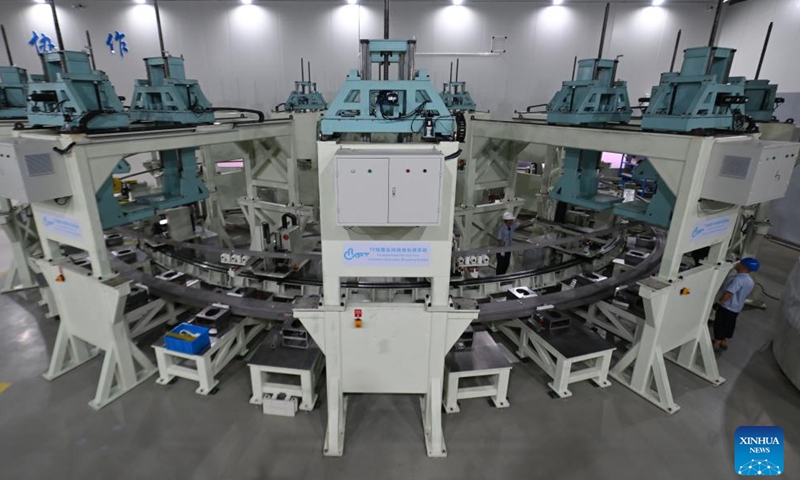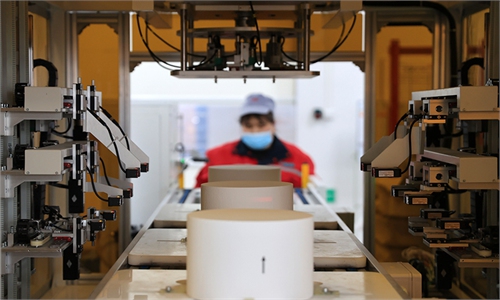Xi stresses advancing new industrialization to lay strong foundation for Chinese modernization

This photo taken on Sept. 15, 2023 shows the Toroidal Field Coil Turn Insulation Automatic Wrapping System in the park of Comprehensive Research Facility for Fusion Technology (CRAFT) in Hefei, east China's Anhui Province.(Xinhua/Zhou Mu)
Chinese President Xi Jinping has stressed the importance of high-quality development in promoting new industrialization to lay a strong material and technological foundation for Chinese modernization.
Chinese analysts said the emphasis on new industrialization by the Chinese top leader showed the determination of Chinese policymakers to seize the opportunity presented by new industrialization in the high-quality development of the world's second-largest economy, in further pushing and facilitating an industrial upgrade process already under way for the world's factory, and in tapping new industrialization's potential to strengthen the weak links of the economy with improved innovation capacity.
The strategy will solidify and reinforce China's industrial and supply chains and further promote the growth of high value-added sectors. The Chinese economy is upgrading from its previous growth model that has experienced resource and environmental constraints, they noted.
New industrialization, underpinned by digital and intelligent technologies, is the path to modernization and industrial upgrading, experts said. They noted that China's industrial chain is comprehensive, but still has vast room to improve in terms of high-end sectors, cutting-edge technologies and high value-added items.
Xi, also general secretary of the Communist Party of China Central Committee and chairman of the Central Military Commission, made the remarks in a recent instruction on pushing forward new industrialization.
Xi said that realizing new industrialization is a key task in China's pursuit of Chinese modernization to build a stronger country and advance national rejuvenation in the new era.
To lay a strong material and technological foundation for Chinese modernization, Xi called for efforts to adapt to and lead the new round of scientific and technological revolution and industrial transformation, seek high-quality development in the promotion of new industrialization, and integrate the construction of a manufacturing powerhouse with the development of the digital economy and industrial informatization.
Xi's instruction was read out at a national meeting on pushing forward new industrialization held from Friday to Saturday in Beijing.
Chinese Premier Li Qiang attended the meeting and stressed the importance of improving the resilience and safety of industrial and supply chains, accelerating the improvement of China's industrial innovation capacity, and constantly promoting the optimization and upgrading of the country's industrial structure.
Chinese analysts said that after decades of playing catch-up in traditional industrialization, mastering production know-how and management expertise, China has already become a major global industrial power. Now the country stands at a turning point where it can empower its manufacturing capacity due to the possibilities offered by emerging digital and smart technologies.
Although China has a lead in certain areas, such as e-commerce and mobile payments, the overall development level of the digital economy is still low when viewed in a global perspective.
In 2022, China's digital economy accounted for just over 40 percent of its GDP, lower than ratios of the US, Germany, Japan and South Korea, per a July report released by China Academy of Information and Communications Technology.
"Now it is a crucial moment for the country to tap the power of automation, powered by new digital and information technologies and the essence of new industrialization, to lift China's social management, operation, production, and services to a whole new level," Xiang Ligang, director-general of the Beijing-based Information Consumption Alliance, told the Global Times on Sunday.
Higher efficiency and lower costs would be direct results out of this push, which will enable China's industrial sector to do things that can only be dreamed of at the current stage, Xiang said.
Wan Zhe, an economist and professor at the Belt and Road School of Beijing Normal University, told the Global Times that beefing up China's innovation capacity, as the instruction urged, will be the pathway for China's industrial upgrade, which involves the upgrading of human resources, production materials and others.
The push for new industrialization is coupled with progress made in China's innovation-driven development strategy.
China's R&D investment exceeded 1 trillion yuan ($137 billion) in 2012 and 2 trillion yuan in 2019, and it took only three years to raise it to 3 trillion yuan in 2022, according to the National Bureau of Statistics.
A recent report also showed that the number of China-originated articles published in the most influential journals in various disciplines reached 16,349, surpassing the US for the first time in history.
Supply chain resilience
Xi's instruction coincided with some achievements China has made in certain areas amid fierce competition, crackdowns or even chokeholds in some industries by a group of US-led countries under the mind-set of "small yard, high fence."
Chinese telecommunication giant Huawei is set to launch its flagship Mate 60 smartphone on Monday, which is believed to have a China-made, advanced 7-nanometer processor, defying the US' relentless technology denial strategy.
"Some rapid and remarkable progress was achieved in the past two years. For chips, it is estimated that China's self-sufficiency rate for chips will reach 25 percent in 2023, surging from 5 percent in 2018 following years of crackdowns by the US," Xiang said. "We used to believe the journey would take much longer, but the results show that when China sets its mind to a task and concentrates its industrial might, it can achieve what it takes other countries 20 years to do."
The EU's recent announcement of the protectionism-prone anti-subsidy investigation against new-energy vehicles made in China reflects the country's rapid advances in the sector, with the nation becoming a worthy challenger to the EU's time-honored automotive industry more than a decade earlier than anticipated.
"It might be that such unexpected progress has allowed Chinese policymakers to clearly see the opportunities and potential of China's industrial sector and encouraged them to aim higher," Xiang said.
"As China's industrialization process enters an age powered by new technologies including artificial intelligence and big data, China will plan a complete layout covering each node of the industrial and supply chain to forge a more secure supply chain and bring down the risks of future chokeholds," Xiang said.
Fiscal and monetary policies and the capital market are expected to offer more support to new infrastructure and sci-tech and innovative enterprises, which are the spearheads of new industrialization, Zhou Maohua, an economist at Everbright Bank, told the Global Times on Sunday.
China's pursuit of new industrialization will also boost the country's agriculture, analysts said, with the new industrialization having huge potential in further lifting the output, security and value of agricultural industries.
From weather forecasting based on information technology to monitoring pests and diseases and producing seed with genetic technologies, new industrialization has profound implications for agriculture, Wan said.


